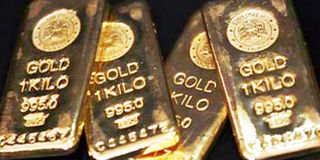South African firm sucked into gold scam

Investigations have not established how a 2.5-tonne consignment was transported to Kenya. The gold is said to have been smuggled from illegal minefields in Kivu region of the DRC. Photo/FILE
An investigation into the Sh8 billion missing gold is to be extended to South Africa.
Emerging details show a company based there was the first to raise the red flag over a 2.5-tonne consignment smuggled from the Democratic Republic of Congo.
Fifteen Kenyans are being investigated over the missing gold.
The South African-based company was supposed to assist in the purchase of the consignment between vendors in DRC and a buyer in Dubai, United Arab Emirates.
The company is said to have received transaction documents from the buyer, that had been prepared by vendors and in turn sent copies to the DRC Government for authentication, since gold mining and sale is heavily controlled by the State.
DRC authorities said the documents were falsified, triggering the investigation last month and has since attracted intervention of President Kibaki and DRC President Joseph Kabila. (Read: Joint team to seek smuggled gold)
The documents showed the 2.5 tonnes of gold were stored at a warehouse in Nairobi, but the consignment has not been found.
Police have so far got evidence linking two Kenyan businessmen, who are among the 15, and further details show they have pending court cases relating to past illegal dealings in the precious metal, the Nation found out.
The evidence was obtained after police raided an office of one of the businessmen at the city centre and a factory in Karen.
Police found preserved copies of the documents that DRC Government said were false in his computer. The suspect uses an alias and easily passes as either a Kenyan or a citizen of DRC.
A prominent Nairobi-based lawyer represents the businessman in most of his dealings. In court, the businessman is accused of defrauding two foreigners of Sh16 million in a transaction where he was selling gold to them.
Police had by on Sunday interrogated six people and were looking for the rest in their quest to unravel the mystery surrounding the missing consignment.
Among those who have recorded statements with the police is a member of a prominent family and an influential businessman with interests in the gold trade.
President Kabila visited Nairobi last week and gave his host a list of 15 people under investigation for being involved gold smuggling.
The probe that brought the DRC President to Kenya started last month when he dispatched his ministers Raymond Tshibanda and Martin Kabwelulu to Nairobi with details of the smuggling syndicate.
Detectives from the two countries, with the help of Interpol, have for the past weeks been looking for the consignment but had no haul to show for their efforts.
President Kabila and his host held two meetings on Thursday and Friday, where police chief Mathew Iteere and CID director Ndegwa Muhoro were summoned to give an update of the probe.
The CID has been conducting the investigations with the Kenya Revenue Authority (KRA) and the Immigration Department.
KRA senior assistant commissioner Joseph Cheptarus, who had been seconded to the investigation team, was shot dead last week as he entered his home in Nairobi’s South C Estate. (Read: Gold probe cited over murder)
The two presidents formed a joint team of investigators to take on the investigation.
A joint statement read by Internal Security minister George Saitoti indicated Kenya is a frequent route for gold from DRC, serving genuine and illegal trade for overseas markets.
“They (the presidents) instructed police authorities in both countries to share information on suspected persons as well as registered dealers in minerals,” said Prof Saitoti.
Investigations have not established how the gold consignment was transported to Kenya. The gold is said to have been smuggled from illegal minefields in Kivu region of the DRC.
Prof Saitoti, who spoke in the company of the DRC ministers, did not say the quantity of gold involved, only saying it’s “a significant amount.”
The presidents resolved to stop illegal exploitation of minerals because it’s the source of armed conflict in Eastern DRC.
The illegal trade raises security concerns because of the huge amount of money the mineral attracts in the black market, with authorities fearing that unscrupulous traders could use the wealth to purchase weapons and fuel fighting in an already volatile region.




